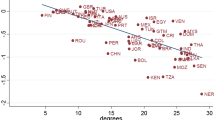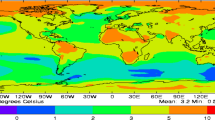Abstract
Societies adapt to climate variations and develop unique cultures that lead to distinctive economic behaviour across different regions. To estimate the climate-economic link and test the hypothetical role of culture, this paper uses a nationwide survey at the household level in China, together with historical temperature data at the prefectural city level for empirical analysis. The results show the significant role of local climate variations on consumption, savings and investment decisions by households. Harsh weather conditions are associated with lower consumption, lower income and higher savings. Such climate characteristics are also associated with a lower probability of purchasing risky financial assets. Using a sample of migrating families, we find strong evidence that culture is an important channel in the climate-economic relationship. Additional support for this view is found through the “catching up with the Joneses” effect documented in the economics literature. Overall, this research provides an alternative perspective for understanding the long-term behavioural impact of climate change.



Similar content being viewed by others
Notes
The cultural effects are unlikely to change over time. To check this, we also use the 2015 round survey and the results are reported in appendix 2.
Source of data: www.data.cma.cn.
For the list of variables and their basic descriptive statistics, see Table 1.
Discretionary consumption is for goods and services that are non-essential for consumers but desirable. Examples include durable goods, entertainment, leisure activities etc.
City-specific control variables may be correlated and thus cause problems. We follow the comments of an anonymous reviewer to check correlations and the sensitivity of our results to these variables. It is found that the correlations are generally low. City level GDP is the most important variable but the main results stand irrespective to the choices (please refer to appendix 7 for more information).
References
Abel AB (1990) Asset prices under habit formation and catching up with the Joneses. National Bureau of Economic Research w3279
Adger WN, Barnett J, Brown K, Marshall N, O'Brien K (2013) Cultural dimensions of climate change impacts and adaptation. Nat Clim Chang 3(2):112–117
Aldunce P, Beilin R, Howden M, Handmer J (2015) Resilience for disaster risk management in a changing climate: practitioners’ frames and practices. Glob Environ Chang 30:1–11
Babiker MH (2005) Climate change policy, market structure, and carbon leakage. J Int Econ 65(2):421–445
Beugelsdijk S, Maseland R (2010) Culture in economics: history, methodological reflections and contemporary applications. New York, Cambridge University Press
Campbell JY, Cochrane JH (1999) By force of habit: a consumption-based explanation of aggregate stock market behavior. J Polit Econ 107(2):205–251
Carleton TA, Hsiang SM (2016) Social and economic impacts of climate. Science 353(6304):aad9837
Ciscar JC, Iglesias A, Feyen L, Szabó L, Van Regemorter D, Amelung B et al (2011) Physical and economic consequences of climate change in Europe. Proc Natl Acad Sci 108(7):2678–2683
Crate SA (2011) Climate and culture: anthropology in the era of contemporary climate change. Annu Rev Anthropol 40:175–194
Crona B, Wutich A, Brewis A, Gartin M (2013) Perceptions of climate change: linking local and global perceptions through a cultural knowledge approach. Clim Chang 119(2):519–531
Dell M, Jones BF, Olken BA (2009) Temperature and income: reconciling new cross-sectional and panel estimates. Am Econ Rev 99(2):198–204
Dell M, Jones BF, Olken BA (2012) Climate shocks and economic growth: evidence from the last half century. Am Econ J Macroecon 4(3):66–95
DeMenocal PB (2001) Cultural responses to climate change during the late Holocene. Science 292(5517):667–673
Domingues CM, Church JA, White NJ, Gleckler PJ, Wijffels SE, Barker PM, Dunn JR (2008) Improved estimates of upper-ocean warming and multi-decadal sea-level rise. Nature 453(7198):1090–1093
Edenhofer O (2015) Climate change 2014: mitigation of climate change (Vol. 3). New York, Cambridge University Press
Falco C, Galeotti M, Olper A (2019) Climate change and migration: is agriculture the main channel? Glob Environ Chang 59:101995
Fellows R, Liu AM (2013) Use and misuse of the concept of culture. Constr Manag Econ 31(5):401–422
Franzke CL (2014) Warming trends: nonlinear climate change. Nat Clim Chang 4(6):423–424
Gao N, Liang P (2019) Home value misestimation and household behavior: evidence from China. China Econ Rev 55:168–180
Halleröd B, Bradshaw J, Holmes H (1997) Adapting the consensual definition of poverty. In Gordon, D. and Pantazis, C. (eds.), Breadline Britain in the 1990s. Aldershot, UK: Ashgate, 214-235
Hofstede G (2001) Culture’s consequences: comparing values, behaviors, institutions, and organizations across nations, 2nd ed. Thousand Oaks, CA: Sage
Huntington E (1915) Civilization and climate. New Haven: Yale University Press
Ji F, Wu Z, Huang J, Chassignet EP (2014) Evolution of land surface air temperature trend. Nat Clim Chang 4(6):462–466
Jury MR (2002) Economic impacts of climate variability in South Africa and development of resource prediction models. J Appl Meteorol 41(1):46–55
Katz RW, Brown BG (1992) Extreme events in a changing climate: variability is more important than averages. Clim Chang 21(3):289–302
Kriegler E, O’Neill BC, Hallegatte S, Kram T, Lempert RJ, Moss RH, Wilbanks T (2012) The need for and use of socio-economic scenarios for climate change analysis: a new approach based on shared socio-economic pathways. Glob Environ Chang 22(4):807–822
Kroeber AL, Kluckhohn C (1952) Culture: a critical review of concepts and definitions. Papers of the Peabody Museum of American Archaeology and Ethnology, Harvard Univeristy, 47(1) 223
Lambert B, Kontonatsios G, Mauch M, Kokkoris T, Jockers M, Ananiadou S, Leroi AM (2020) The pace of modern culture. Nat Hum Behav 4(4):352–360
Leonard S, Parsons M, Olawsky K, Kofod F (2013) The role of culture and traditional knowledge in climate change adaptation: insights from East Kimberley, Australia. Glob Environ Chang 23(3):623–632
Li J, Zhang D, Su B (2019) The impact of social awareness and lifestyles on household carbon emissions in China. Ecol Econ 160:145–155
Menapace L, Colson G, Raffaelli R (2015) Climate change beliefs and perceptions of agricultural risks: an application of the exchangeability method. Glob Environ Chang 35:70–81
Nielsen JØ, Reenberg A (2010) Cultural barriers to climate change adaptation: a case study from Northern Burkina Faso. Glob Environ Chang 20(1):142–152
Parker PM, Tavassoli NT (2000) Homeostasis and consumer behavior across cultures. Int J Res Mark 17(1):33–53
Pendergraft CA (1998) Human dimensions of climate change: cultural theory and collective action. Clim Chang 39(4):643–666
Schwartz SH, Bardi A (2001) Value hierarchies across cultures: taking a similarities perspective. J Cross-Cult Psychol 32(3):268–290
Skjeflo S (2013) Measuring household vulnerability to climate change—why markets matter. Glob Environ Chang 23(6):1694–1701
Skoufias E, Vinha K (2013) The impacts of climate variability on household welfare in rural Mexico. Popul Environ 34(3):370–399
Tavassoli NT (2009) Climate, psychological homeostasis, and individual behaviors across cultures. In Wyer, R.S, Chiu, C., Hong, Y. (eds.) Understanding Culture: Theory, Research, and Application, Psychology Press, Chapter 11
Thurlow J, Zhu T, Diao X (2012) Current climate variability and future climate change: estimated growth and poverty impacts for Zambia. Rev Dev Econ 16(3):394–411
Van de Vliert E (2007) Climates create cultures. Soc Personal Psychol Compass 1(1):53–67
Wang H, Zhang D, Guariglia A, Fan GZ (2021) ‘Growing out of the growing pain’: financial literacy and life insurance demand in China. Pac Basin Financ J 66:101459
Willows R, Reynard N, Meadowcroft I, Connell R (2003) Climate adaptation: Risk, uncertainty and decision-making. UKCIP Technical Report. UK Climate Impacts Programme
Zhang D (2016) Understanding China from a household’s perspective: studies based on the China household finance survey (CHFS). Emerg Mark Financ Trade 52(8):1725–1727
Acknowledgements
Supports from the National Natural Science Foundation of China under Grant No. 71974159 and No. 72022020, 111 Project Grant No. B16040 are acknowledged.
Author information
Authors and Affiliations
Corresponding author
Additional information
Publisher’s note
Springer Nature remains neutral with regard to jurisdictional claims in published maps and institutional affiliations.
Supplementary Information
ESM 1
(DOCX 263 kb)
Rights and permissions
About this article
Cite this article
Zhang, D., Li, J., Ji, Q. et al. Climate variations, culture and economic behaviour of Chinese households. Climatic Change 167, 9 (2021). https://doi.org/10.1007/s10584-021-03145-6
Received:
Accepted:
Published:
DOI: https://doi.org/10.1007/s10584-021-03145-6




